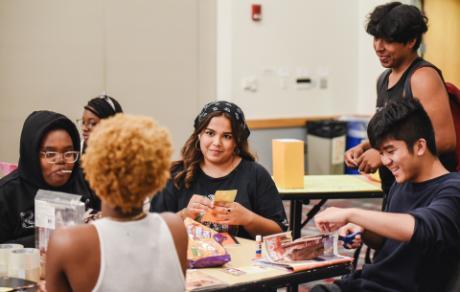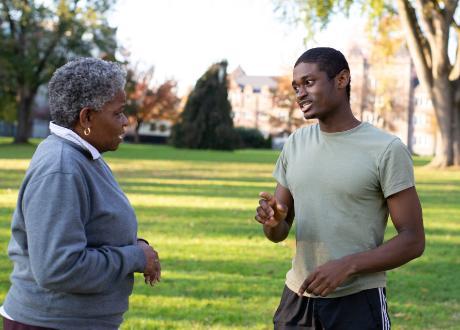
Muhlenberg's Emerging Leaders Program offers first- and second-year students an opportunity to belong to a community of future leaders. Through this program, students who have demonstrated leadership potential and interest in civic engagement, critical dialogue, and social change participate in an academically focused cohort.
The Emerging Leaders Program, which began at Muhlenberg in 2009, endorses excellence and leadership throughout the college experience.
Bolstered in the Fall of 2024 by a $250,000 grant from the American Talent Initiative, the Emerging Leaders Program will soon include a pre-college program for high school students, increase faculty involvement, and strengthen the program’s leadership development component.
Mentors Making a Difference
Since its inception, the Emerging Leaders program has been rooted in “intentional advising,” which provides coordinated, coaching-style advising by highly trained faculty advisors, staff mentors, and peer mentors.
With the addition of Muhlenberg’s new coaching model, students benefit from three separate mentors, each of whom can provide a particular perspective and increase the chances of a meaningful connection. No single mentor can be everything to each student, but by pulling together support from a variety of places on campus, the Emerging Leaders Program seeks to strengthen every participant’s network of community support.
- Peer Mentor: A peer mentor, typically a second-year student, can help create social connections for their mentee. They can provide real-world advice on how to establish the best habits and routines for academic success and give the inside scoop about professors and classes.
- Staff Mentor: Staff mentors from offices all over campus can help students navigate what can seem, especially to first-generation college students, a myriad of college resources. Assistance can range from helping to find healthcare options or negotiating grant applications to offset financial emergencies. Staff mentors can also serve as trusted advisors to raise issues of social or familial concerns that could be more difficult to raise with faculty.
- Faculty Advisor: Faculty advisors choose to be a part of the program through dedicated First-Year Seminars and act as a student’s primary academic advisor. They provide insight for class selection, help students explore potential majors, and ensure students remain on track to complete their degree.

Meetings between the mentors, the program co-directors, and the program coordinator ensure that program goals are met, and allow for adjustments, the sharing of successes, and opportunities to identify students who may benefit from additional guidance.
Successful cohort initiatives are grounded in social psychology and student affairs research, which show time and again how providing a sense of belonging and multi-faceted support for students enhances their likelihood of success.
Emerging Leaders Program Directors
- Robin Riley-Casey, Associate Dean of Students and Diversity Initiatives;
[email protected] - Beth Halpern, Director of Community Engagement; [email protected]
- Gretchen Gotthard, Dean of Academic Life; [email protected]
